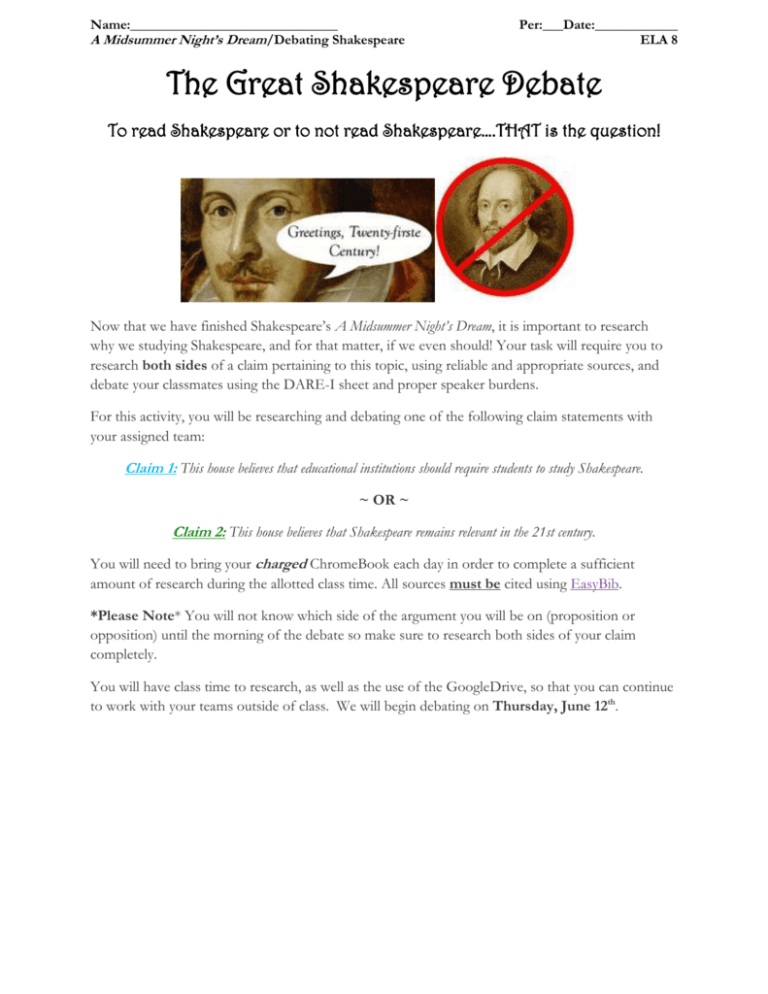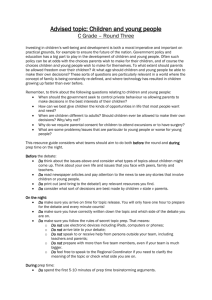The Great Shakespeare Debate Assignment
advertisement

Name:______________________________ A Midsummer Night’s Dream/Debating Shakespeare Per:___Date:____________ ELA 8 The Great Shakespeare Debate To read Shakespeare or to not read Shakespeare….THAT is the question! Now that we have finished Shakespeare’s A Midsummer Night’s Dream, it is important to research why we studying Shakespeare, and for that matter, if we even should! Your task will require you to research both sides of a claim pertaining to this topic, using reliable and appropriate sources, and debate your classmates using the DARE-I sheet and proper speaker burdens. For this activity, you will be researching and debating one of the following claim statements with your assigned team: Claim 1: This house believes that educational institutions should require students to study Shakespeare. ~ OR ~ Claim 2: This house believes that Shakespeare remains relevant in the 21st century. You will need to bring your charged ChromeBook each day in order to complete a sufficient amount of research during the allotted class time. All sources must be cited using EasyBib. *Please Note* You will not know which side of the argument you will be on (proposition or opposition) until the morning of the debate so make sure to research both sides of your claim completely. You will have class time to research, as well as the use of the GoogleDrive, so that you can continue to work with your teams outside of class. We will begin debating on Thursday, June 12th. Name:______________________________ A Midsummer Night’s Dream/Debating Shakespeare Per:___Date:____________ ELA 8 Use the resources below to help get your research started: Works Cited Bruster, Douglas. "William Shakespeare’s Relevance in Today’s Society Is Changing." William Shakespeare’s Relevance in Today’s Society Is Changing. Know, 23 Apr. 2014. Web. 05 June 2014. Clark, Nick. "Simon Callow Calls for More Shakespeare to Be Taught in Schools: Actor and Director Says the Bard Teaches Children 'Basic Life Lessons'" The Independent. Independent Digital News and Media, 14 Mar. 2014. Web. 05 June 2014. Marr, Andrew. "Shakespeare in the 21st Century." BBC News. BBC, 8 July 2012. Web. 05 June 2014. Powell, Mark. "Kill Bill: Why We Must Take Shakespeare out of the Classroom." Theguardian.com. Guardian News and Media, 17 Mar. 2014. Web. 05 June 2014. Raleigh, Walter Alexander. Shakespeare: Why Bother? New York: Macmillan, 1907. FilmEducation.org. CinemaNX, 2009. Web. 3 June 2014. Wiseman, Gemma. "Shakespeare Is the Bards Work Still Relevant." By Gemma Wiseman. Humanities360, 9 June 2007. Web. 05 June 2014. **This is also how your works cited page should look when you complete your research!** Name:______________________________ A Midsummer Night’s Dream/Debating Shakespeare Debate Terms to Know Per:___Date:____________ ELA 8 Definition of Topic: Clarifies terms and sets the limits of the debate Roadmap: Tells listeners (teammates, opposing team, judges, etc) what you will be discussing and in what order briefly; keeps your speech organized. Signpost: Marks what you are doing for the listener (Our first argument…). This is similar to transitions in writing. Introduction: Introduces the topic with a quote, statistic compelling narrative or other device Conclusion: Closes the topic with a mini crystallization, a preview of what the most important elements of the topic are DARE-I Arguments: Arguments that each have Definitions, Assertions (statement that you are proving), Reasoning (why), Evidence (facts and supporting information to support your assertion), and Impact (the importance of this issue on a larger scale) Refute: Using evidence to disprove the opposing teams arguments Rebuild: A method for responding to your teams own arguments that have been knocked down to make them strong again. Crystallize: Boiling down the cases to their main ideas, what they are basically talking about. NOT a summary; their impact in the real world Weigh: Using criteria, tell the judge specifically why your side has won and why your arguments matter more Basic Outline of a Debate: What You Should Say and When It is important to note that each speaker has very specific tasks that they are responsible for, called burdens. Each speaker has advantages and challenges that they have to face throughout the debate. Before deciding which speaker you would like to be, consider your strengths and discuss it as a team. 1st Proposition (PROP) Speaker: (5 Minutes) 1. Introduction 2. Hello, my name is (optional) 3. State claim 4. Quick thanks 5. Roadmap 6. Definition 7. Plan (optional) 8. 3 to 5 DARE-I Arguments (make sure to signpost) 9. Conclusion 1st Opposition (OPP) Speaker: (5 minutes) 1. Introduction 2. Hello, my name is (optional) 3. State counter-claim (AGAINST the topic…) 4. Quick thanks 5. Roadmap 6. Counterplan (optional): How are you going to go against the Proposition? 7. Refutation of all PROP arguments made up to this point (make sure to signpost) 8. 3 to 5 Arguments that support your claim (Use your DARE-I & Flow Sheets to help you and make sure to signpost) 9. Conclusion: Tie it up. Name:______________________________ A Midsummer Night’s Dream/Debating Shakespeare Per:___Date:____________ ELA 8 2nd PROP Speaker: (5 minutes) 1. Introduction 2. Quick thanks 3. Reminder of definition 4. Roadmap 5. Attack Counterplan (if one was given) 6. Refutation of all OPP arguments up to this point (make sure to signpost) 7. Rebuild all PROP arguments that the OPP refuted (make sure to signpost) 8. 1 or 2 NEW Arguments that support your claim (Use your DARE-I & Flow Sheets to help you and make sure to signpost) 9. Conclusion: Tie it up 2nd OPP Speaker: (5 Minutes) 1. Introduction 2. Quick thanks 3. Reminder/defense of counterplan (if one was given) 4. Roadmap 5. Refutation of all PROP arguments (make sure to signpost) 6. Rebuild all OPP arguments that PROP refuted (make sure to signpost) 7. 1 or 2 NEW Arguments that support your claim (Use your DARE-I & Flow Sheets to help you and make sure to signpost) 8. Conclusion : Tie it up 3rd OPP Speaker: (3 minutes) 1. Introduction 2. Quick thanks 3. Roadmap 4. Refute any PROP arguments left standing & Rebuild OPP arguments (ONLY if 2nd speaker dropped any arguments, you may group arguments) 5. Crystallize: How does your argument have an effect on the real world? 6. Weigh: Prove to the judge that the OPP should win this debate. 7. Conclusion **3rd Speaker many not bring in any NEW information!** 3rd Prop Speaker: (3 Minutes) 1. Introduction 2. Quick thanks 3. Roadmap 4. Refute any OPP arguments left standing & Rebuild Prop arguments (you may group arguments) 5. Crystallize: How does your argument have an effect on the real world? 6. Weigh: Prove to the judge that the PROP should win this debate. 7. Conclusion **3rd Speaker many not bring in any NEW information!**







